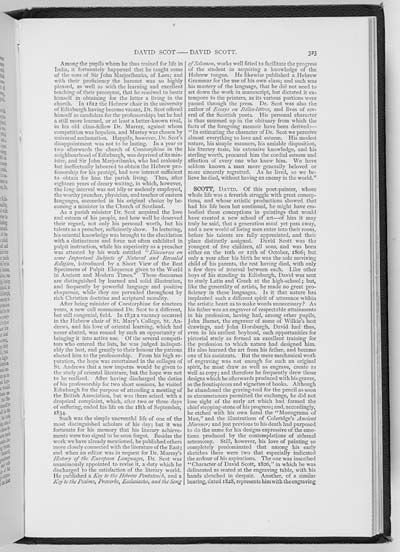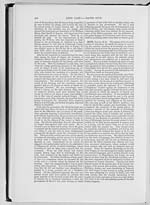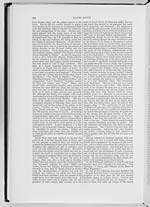323
Among the pupils whom he thus trained for life in
India, it fortunately happened that he taught some
of the sons of Sir John Marjoribanks, of Lees; and
with their proficiency the baronet was so highly
pleased, as well as with the learning and excellent
teaching of their preceptor, that he resolved to bestir
himself in obtaining for the latter a living in the
church. In 1812 the Hebrew chair in the university
of Edinburgh having become vacant, Dr. Scot offered
himself as candidate for the professorship; but he had
a still more learned, or at least a better-known rival,
in his old class-fellow Dr. Murray, against whom
competition was hopeless, and Murray was chosen by
universal acclamation. Happily, however, Dr. Scot's
disappointment was not to be lasting. In a year or
two afterwards the church of Corstorphine in the
neighbourhood of Edinburgh, was deprived of its min-
ister, and Sir John Marjoribanks, who had zealously
but ineffectually laboured to obtain the Hebrew pro-
fessorship for his protege, had now interest sufficient
to obtain for him the parish living. Thus, after
eighteen years of dreary waiting, in which, however,
the long interval was not idly or uselessly employed,
the worthy preacher, physician, and teacher of eastern
languages, succeeded in his original choice by be-
coming a minister in the Church of Scotland.
As a parish minister Dr. Scot acquired the love
and esteem of his people, and how well he deserved
their regard, not only his personal worth, but his
talents as a preacher, sufficiently show. In lecturing,
his oriental knowledge was brought to the elucidation
with a distinctness and force not often exhibited in
pulpit instruction, while his superiority as a preacher
was attested by his work entitled "Discourses on
some Important Subjects of Natural and Revealed
Religion, introduced by a Short View of the Best
Specimens of Pulpit Eloquence given to the World
in Ancient and Modern Times." These discourses
are distinguished by learned and solid illustration,
and frequently by powerful language and positive
eloquence, while they are pervaded throughout by
rich Christian doctrine and scriptural morality.
After being minister of Corstorphine for nineteen
years, a new call summoned Dr. Scot to a different,
but still congenial, field. In 1832 a vacancy occurred
in the Hebrew chair of St. Mary's College, St. An-
drews, and his love of oriental learning, which had
never abated, was roused by such an opportunity of
bringing it into active use. Of the several competi-
tors who entered the lists, he was judged indisput-
ably the best, and greatly to their honour the patrons
elected him to the professorship. From his high re-
putation, the hope was entertained in the colleges of
St. Andrews that a new impetus would be given to
the study of oriental literature, but the hope was not
to be realized. After having discharged the duties
of his professorship for two short sessions, he visited
Edinburgh for the purpose of attending a meeting of
the British Association, but was there seized with a
dropsical complaint, which, after two or three days
of suffering, ended his life on the i8th of September,
1834.
Such was the simple uneventful life of one of the
most distinguished scholars of his day; but it was
fortunate for his memory that his literary achieve-
ments were too signal to be soon forgot. Besides the
work we have already mentioned, he published others
more closely connected with the literature of the East;
and when an editor was in request for Dr. Murray's
History of the European Languages, Dr. Scot was
unanimously appointed to revise it, a duty which he
discharged to the satisfaction of the literary world.
He published a Key to the Hebrew Pentateuch, and a
Key to the Psalms, Proverbs, Ecclesiastes, and the Song
of Solomon, works well fitted to facilitate the progress
of the student in acquiring a knowledge of the
Hebrew tongue. He likewise published a Hebrew
Grammar for the use of his own class; and such was
his mastery of the language, that he did not need to
set down the work in manuscript, but dictated it ex-
tempore to the printers, as its various portions were
passed through the press. Dr. Scot was also the
author of Essays on Belles-lettres, and lives of sev-
eral of the Scottish poets. His personal character
is thus summed up in the obituary from which the
facts of the foregoing memoir have been derived:�
"In estimating the character of Dr. Scot we perceive
almost everything to love and esteem. His modest
nature, his simple manners, his amiable disposition,
his literary taste, his extensive knowledge, and his
sterling worth, procured him the cordial esteem and
affection of every one who knew him. We have
seldom known a man more generally beloved or
more sincerely regretted. As he lived, so we be-
lieve he died, without having an enemy in the world."
SCOTT, DAVID, Of this poet-painter, whose
whole life was a feverish struggle with great concep-
tions, and whose artistic productions showed that
had his life been but continued, he might have em-
bodied these conceptions in paintings that would
have created a new school of art�of him it may
truly be said, that a generation must yet pass away,
and a new world of living men enter into their room,
before his talents are fully appreciated, and their
place distinctly assigned. David Scott was the
youngest of five children, all sons, and was born
either on the 10th or lath of October, 1806; but
only a year after his birth he was the sole surviving
child of his parents, the rest having died, with only
a few days of interval between each. Like other
boys of his standing in Edinburgh, David was sent
to study Latin and Greek at the high-school; but,
like the generality of artists, he made no great pro-
ficiency in these languages. Is it that nature has
implanted such a different spirit of utterance within
the artistic heart as to make words unnecessary? As
his father was an engraver of respectable attainments
in his profession, having had, among other pupils,
John Burnet, the engraver of some of Wilkie's best
drawings, and John Horsburgh, David had thus,
even in his earliest boyhood, such opportunities for
pictorial study as formed an excellent training for
the profession to which nature had designed him.
He also learned the art from his father, and became
one of his assistants. But the mere mechanical work
of engraving was not enough for such an original
spirit, he must draw as well as engrave, create as
well as copy; and therefore he frequently drew those
designs which he afterwards produced with his graver,
as the frontispieces and vignettes of books. Although
he abandoned the graving-tool for the pencil as soon
as circumstances permitted the exchange, he did not
lose sight of the early art which had formed the
chief stepping-stone of his progress; and, accordingly,
he etched with his own hand the "Monograms of
Man," and the illustrations of Coleridge's Ancient
Mariner; and just previous to his death had purposed
to do the same for his designs expressive of the emo-
tions produced by the contemplations of sidereal
astronomy. Still, however, his love of painting so
completely predominated that among his early
sketches there were two that especially indicated
the ardour of his aspirations. The one was inscribed
"Character of David Scott, 1826," in which he was
delineated as seated at the engraving table, with his
hands clenched in despair. Another, of a similar
bearing, dated 1828, represents him with the engraving

![]() Universal Viewer |
Universal Viewer | ![]() Mirador |
Large image | Transcription
Mirador |
Large image | Transcription
![]()

